KEY TAKEAWAYS
- Green technology is essential for Nigeria’s sustainable future, helping address energy poverty, environmental degradation, and waste mismanagement while promoting economic resilience.
- Projects like the Nigeria Electrification Project and Solar Nigeria Program are expanding access to renewable energy in off-grid areas, particularly through solar-powered mini-grids and home systems.
- Innovative waste management initiatives, such as WeCyclers and waste-to-energy facilities, are transforming how urban communities handle solid waste while generating value and reducing pollution.
- Sustainable agriculture and electric mobility are emerging priorities, with solar-powered irrigation systems supporting rural farmers and electric vehicles offering cleaner alternatives in urban transport.
- Collaboration, investment, and strong governance are critical to scaling green technologies and ensuring their long-term impact in line with the United Nations Sustainable Development Goals (SDGs).
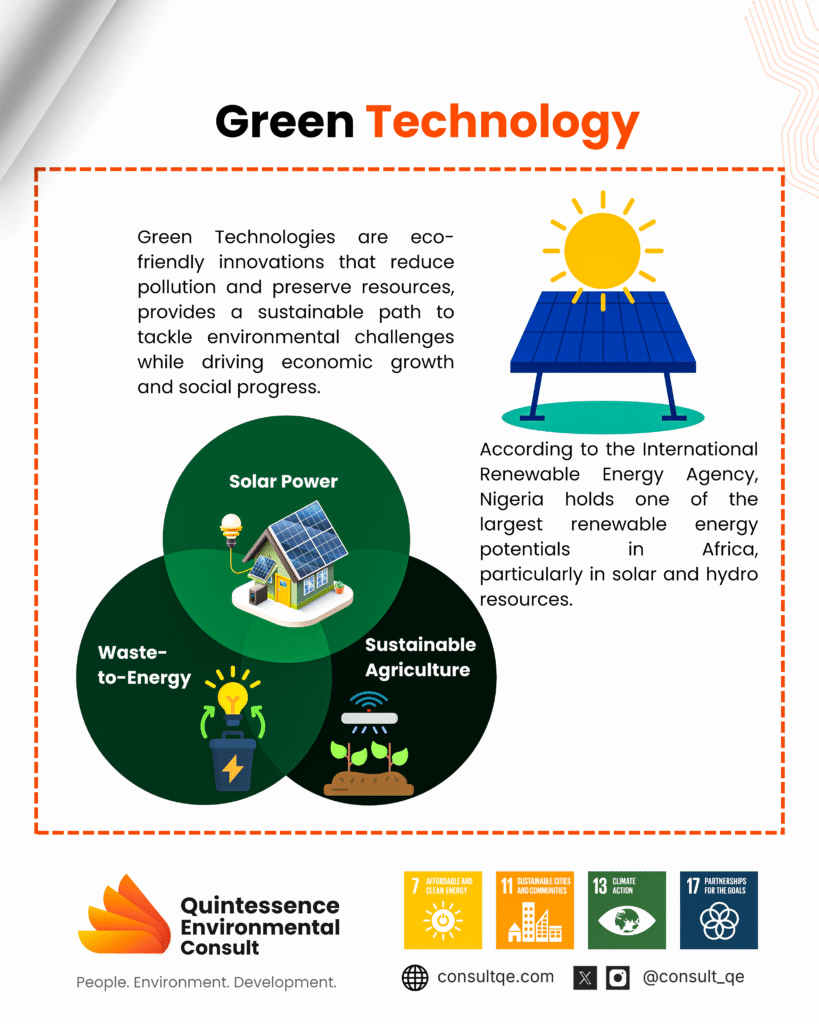
INTRODUCTION
Can a nation rich in oil become a leader in clean, sustainable energy? This question challenges the conventional view of Nigeria, a country long dependent on fossil fuels, as it begins to chart a new course toward environmental sustainability through green technology. With energy deficits, climate change, and environmental degradation, Nigeria is increasingly turning to innovative, eco-friendly solutions. From solar-powered communities to sustainable farming practices, the nation’s embrace of green technology is not just a trend but a transformative movement to drive long-term development and resilience.
Nigeria, as Africa’s most populous country and largest economy, faces a range of environmental and developmental challenges, including erratic power supply, rapid urbanization, deforestation, and high greenhouse gas emissions. Historically reliant on fossil fuels for energy and economic growth, the country is now under pressure to transition toward cleaner, more sustainable practices. Green technology, defined as environmentally friendly innovations that minimize pollution and conserve natural resources, offers a viable pathway to address these issues while promoting economic and social development.
The importance of adopting green technology in Nigeria cannot be overstated. According to the International Renewable Energy Agency, 9 Nigeria holds one of the largest renewable energy potentials in Africa, particularly in solar and hydro resources. Yet, access to clean energy remains limited, especially in rural areas. Furthermore, the World Bank notes that Nigeria generates over 32 million tonnes of waste annually, much of which goes unmanaged.24 Integrating green technology into sectors like energy, agriculture, waste management, and construction is essential not only for mitigating environmental degradation but also for achieving the United Nations Sustainable Development Goals (SDGs) and ensuring long-term national resilience.

INNOVATIONS AND ONGOING PROJECTS DRIVING NIGERIA’S GREEN TRANSITION
- Renewable Energy Solutions
One of the most significant strides in green technology is Nigeria’s increasing investment in renewable energy, particularly solar power. The Nigeria Electrification Project (NEP), supported by the World Bank and implemented by the Rural Electrification Agency (REA), aims to connect over 2.5 million people in off-grid areas through solar mini-grids and solar home systems. 25 The Solar Power Naija Initiative by the Rural Electrification Agency (REA) aims to provide 5 million new connections to 25 million individuals in off-grid communities, highlighting a focus on energy access for those most in need.3
In the Northern region, initiatives like the Solar Nigeria Program have equipped schools and clinics with solar panels, improving both education and healthcare delivery. These efforts not only reduce dependence on diesel generators but also lower carbon emissions, providing sustainable energy alternatives to underserved populations. In the commercial and industrial sector, the Wood Factory Hybrid Solar Project in Abuja, featuring a 600 kw rooftop solar PV system with battery storage, represents a pioneering model for Commercial and Industrial customers, aiming for a significant 44% reduction in energy costs and a guaranteed 95% uptime through a DisCo-enabled project.11 The table below shows some key renewable energy projects in Nigeria, their capacity, location and status.3, 18, 19, 22
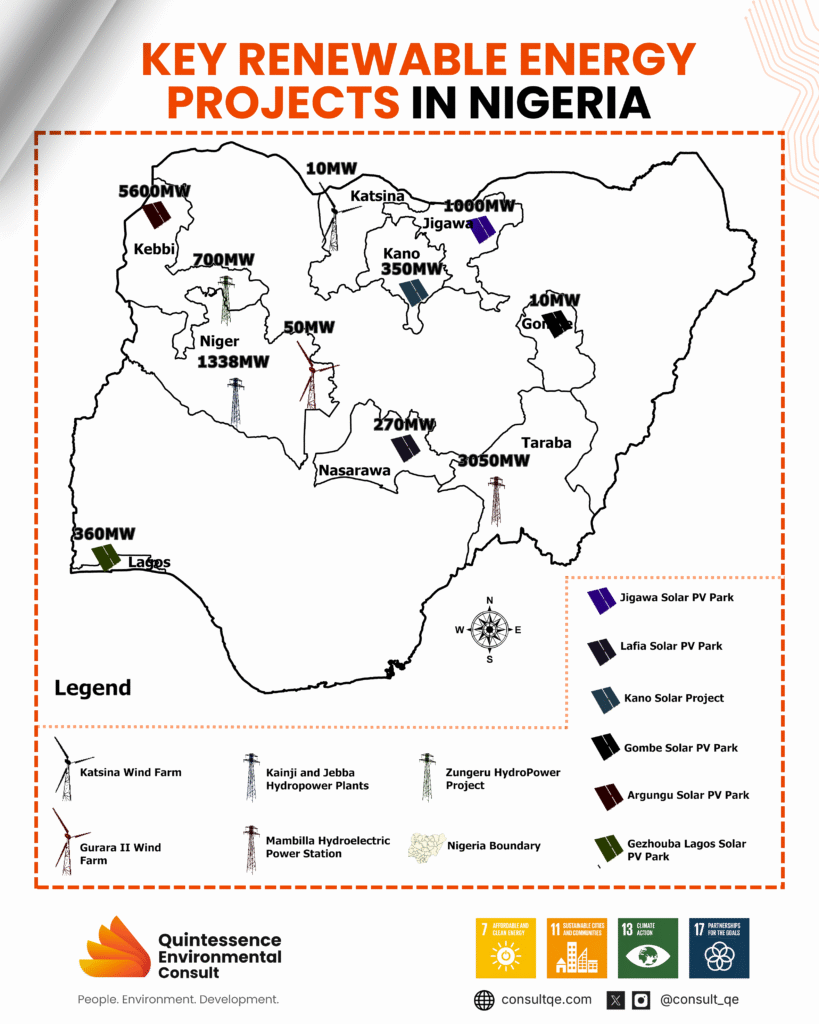
Project Name | Technology Type | Capacity (MW) | Location | Status |
Argungu Solar PV Park | Solar PV | 5600 | Kebbi | Announced |
Jigawa Solar PV Park | Solar PV | 1000 | Jigawa | Announced |
Gezhouba Lagos Solar PV Park | Solar PV | 360 | Lagos | Permitting |
Lafia Solar PV Park | Solar PV | 350 | Nasarawa | Permitting |
Gombe Solar PV Park | Solar PV | 270 | Gombe | Permitting |
Kano Solar Project | Solar PV | 10 | Kano | Commissioned |
Katsina Wind Farm | Wind | 10 | Katsina | Operational (with delays) |
Gurara II Wind Farm | Wind | 50 | Niger | Proposed |
Mambilla Hydroelectric Power Station | Hydropower | 3050 | Taraba | Proposed |
Zungeru Hydropower Project | Hydropower | 700 | Niger | Commissioned |
Kainji and Jebba Hydropower Plants | Hydropower | 1338.4 | Niger | Operational |
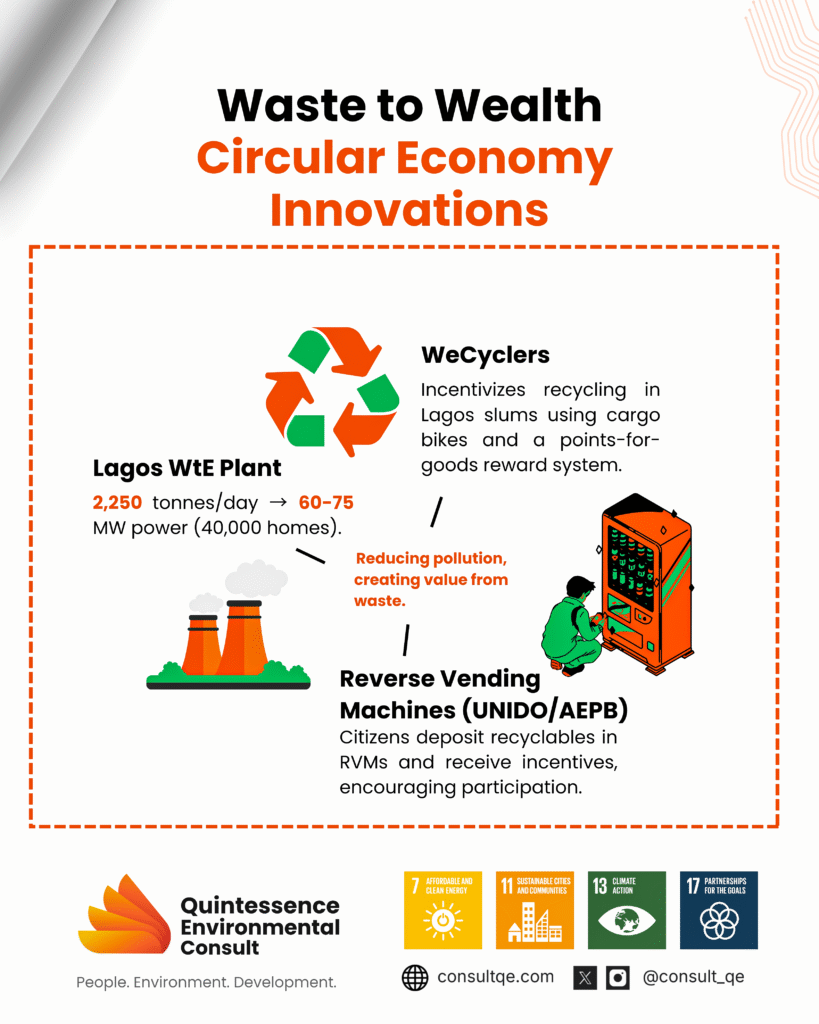
- Waste Management and Recycling Innovations
Nigeria generates over 32 million tonnes of solid waste annually, yet less than 20% is properly managed. 24 Green start-ups like WeCyclers in Lagos have introduced innovative waste collection and recycling systems using low-cost cargo bicycles to serve urban slums. Their model rewards households with points that can be exchanged for essential goods, thereby incentivizing recycling behaviour while tackling urban pollution.
In Abuja, a pilot project has introduced locally fabricated Reverse Vending Machines (RVMs) in some key locations 12 like The Central Park and National Assembly Complex This initiative, a collaboration between United Nations Industrial Development Organization (UNIDO) and the Abuja Environmental Protection Board (AEPB), aims to automate the collection of plastic waste, boost recycling rates, and support Nigeria’s transition to a circular economy. Citizens can deposit waste plastic bottles and aluminum cans into the RVMs in exchange for incentives, encouraging public participation in recycling efforts. The digitally collected data from this project will also inform future waste management strategies.
Waste-to-energy (WtE) projects are gaining momentum as a dual solution for waste management and energy generation. The Lagos State Government has partnered with Harvest Waste Consortium, a Dutch-owned company, to build a high-efficiency waste-to-energy plant at the Epe landfill. 17 This plant will process 2,250 tonnes of waste daily and is expected to generate 60-75 MW of electricity annually, enough to power approximately 40,000 homes. The project also aims to significantly reduce CO2 emissions and divert a large percentage of waste from landfills. Another notable example is the organic waste power plant at the University of Nigeria, Nsukka. 13 This 100 kVA refuse-derived fuel gasification plant utilizes organic waste generated on campus to produce electricity, demonstrating the potential for decentralized WtE solutions within institutions.
Efforts to promote recycling and material recovery are also crucial for a circular economy. Lafarge’s Geocycle Initiative in Nigeria utilizes co-processing technology in its cement kilns to manage industrial, agricultural, and municipal waste.10 This process involves using waste as a substitute for raw materials and as a fuel source in cement production, achieving high rates of recycling and recovery without generating residue. Geocycle manages over 80,000 tons of waste annually, partnering with various sectors, including food and beverage, pharmaceuticals, and oil and gas, to provide sustainable waste management solutions. The National Policy on Plastic Waste Management (NPPWM), introduced in 2021, sets out a clear roadmap for reducing plastic waste and pollution while promoting sustainable practices in the use and recycling of plastics.15 Initiatives like ReflexNG in Lagos, supported by Next Generation Recycling Machines, focus on recycling specific waste streams, such as used water sachets, into new high-quality packaging applications, coupled with awareness campaigns and training for local waste entrepreneurs. 2
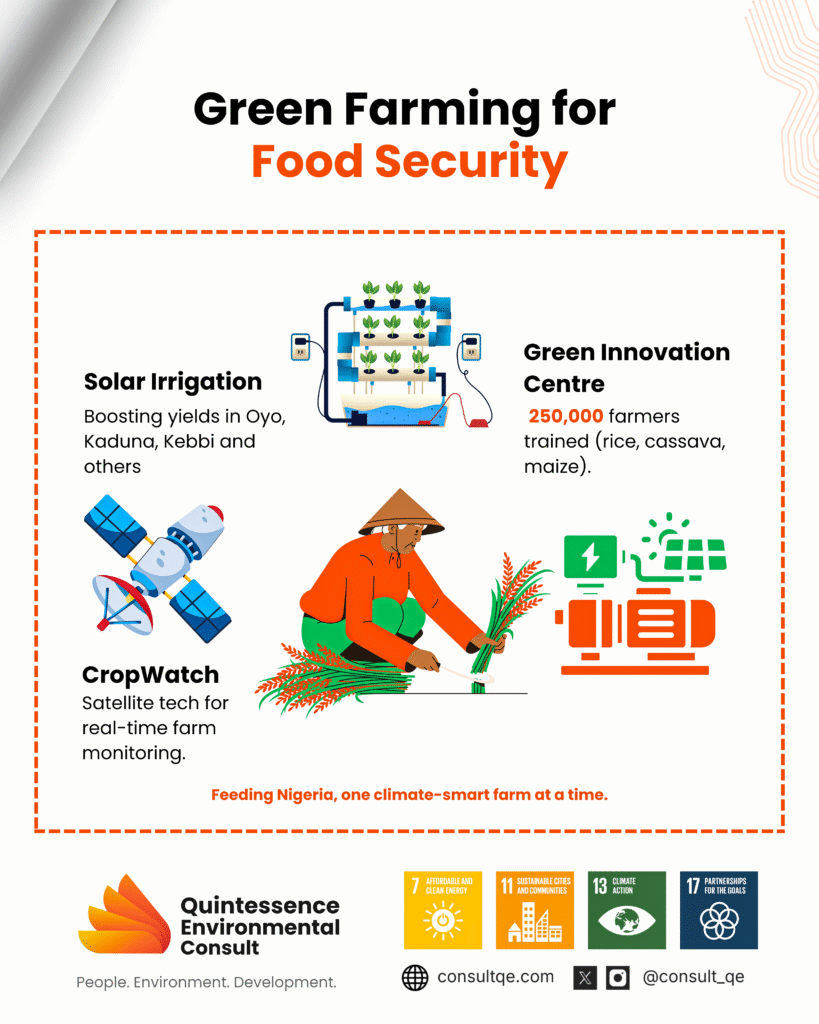
- Sustainable Agriculture
Green technology is also shaping Nigeria’s agriculture and transport sectors. Solar-powered irrigation systems in Oyo, Kaduna, and Kebbi States are helping farmers improve yields while reducing reliance on fuel pumps. These systems support climate-smart agriculture, crucial in a country where over 70% of the population relies on farming.4 The integration of advanced technologies is transforming agricultural practices across Nigeria. The CropWatch Programme, in collaboration with United Nations Trade and Development (UNCTAD), utilizes satellite imagery, earth observation systems, and remote sensing tools to provide real-time agro-climatic and agronomic assessments7. This allows for improved agricultural monitoring, disease identification, and yield prediction, enabling better planning and more resilient farming practices.
The Green Imperative Project (GIP) stands out as the largest agricultural project in Africa, aiming to significantly boost food production through technology transfer, capacity building, the establishment of assembly plants, and the creation of service centers. 8 This project prioritizes sustainable, low-carbon agriculture and focuses on developing food production value chains to reduce Nigeria’s reliance on food imports. Another impactful initiative was the Green Innovation Centre (GIC) project, funded by the German Federal Ministry of Economic Cooperation and Development, which successfully concluded a nine-year journey in March 2024. 1 The GIC project focused on enhancing the income and productivity of 250,000 smallholder farmers by introducing agricultural innovations within the rice, cassava, potato, and maize value chains. The project trained agricultural extension agents and facilitated the training of over 252,000 smallholders, leading to the flourishing of over 80% of supported businesses and the creation of 1,000 new jobs, with a significant emphasis on empowering women and youth. This project’s success highlights the positive impact of targeted interventions in improving agricultural practices and livelihoods.
- Green Building
The construction sector in Nigeria is gradually embracing green building and sustainable construction practices, recognizing the long-term environmental and economic benefits. The Green Building Council Nigeria (GBCN), established in 2010, plays a pivotal role in promoting sustainable building practices across the country. 6 GBCN’s mission is to lead the transformation of Nigeria’s built environment towards environmental, social, and economic sustainability through advocacy, education, the development of local green building standards, and the provision of certification.
Buildings like Primetech’s head office in Abuja and the Nestoil Tower in Lagos have been designed and built according to the requirements of Leadership in Energy and Environmental Design (LEED) certification, demonstrating a commitment to high standards of sustainability. 5 The African Leadership University in Lagos features an extensive green roof, while the Lagos Court of Arbitration incorporates a vertical green wall, highlighting innovative approaches to enhancing energy efficiency and aesthetic appeal in urban buildings. 16 These projects serve as examples of how green building principles can be successfully implemented in the Nigerian context.
The National Building Energy Efficiency Code (BEEC) aims to reduce overall energy consumption in Nigeria by promoting energy-efficient technologies and design practices in both residential and commercial buildings. This code emphasizes passive design principles, which consider local climate conditions, building orientation, and materials to minimize the need for mechanical cooling and lighting. 5
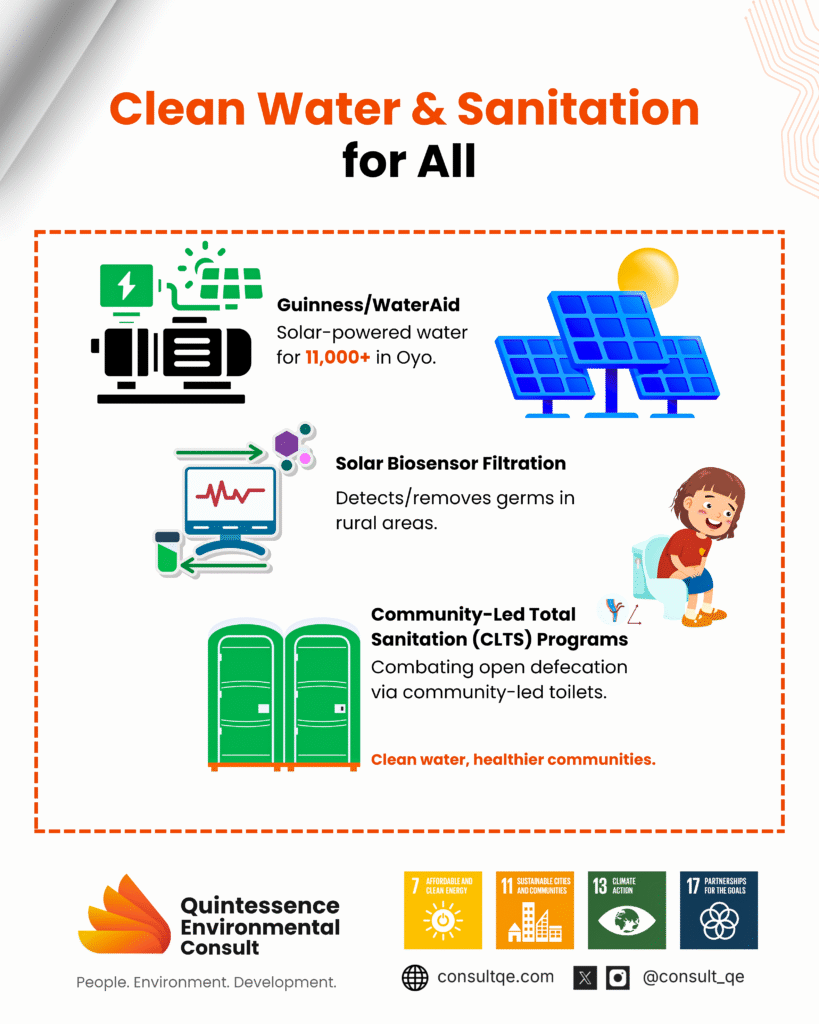
- Water Treatment and Sanitation
Solar power is proving to be a highly effective technology for providing clean water, especially in areas with limited or no access to the electricity grid. The Guinness Nigeria PLC in partnership with WaterAid, commissioned three units of large-capacity solar-powered motorized water infrastructure in Oyo State, providing safe drinking water and hygiene for over 11,000 people. 14 This project highlights the commitment of private sector entities to sustainable development. Nigerian researchers have also developed a solar-powered biosensor filtration device that can detect and remove harmful germs from water, offering a solution for both rural and urban areas facing water contamination.20 Community-Led Total Sanitation (CLTS) programs are being implemented as a key strategy to combat open defecation in Nigeria. 21 CLTS aims to trigger collective behavior change at the community level, leading to increased ownership and usage of improved toilet facilities.
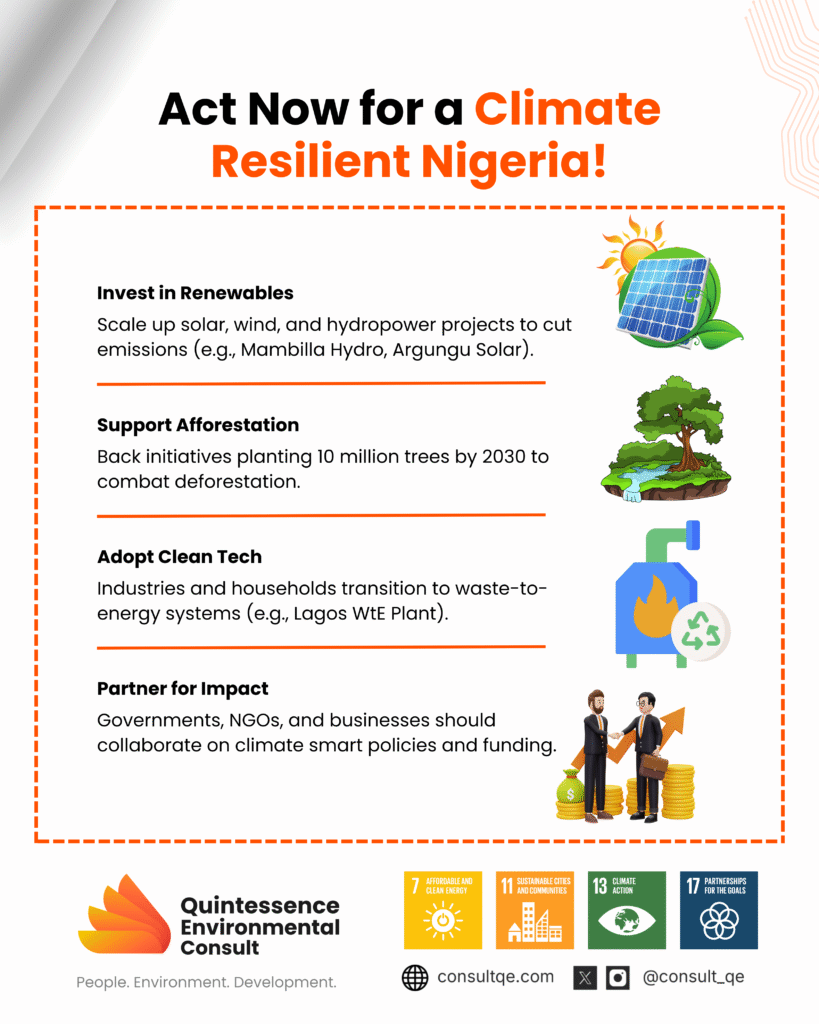
THE NIGERIA’S GREEN PATH FORWARD
The integration of green technology into Nigeria’s development agenda signals a critical shift toward sustainable growth, with far-reaching implications for the environment, economy, and society. By embracing renewable energy, waste management innovation, and eco-friendly agricultural practices, Nigeria is gradually addressing pressing challenges such as energy poverty, environmental degradation, and food insecurity. These advancements align with global sustainability goals, particularly the United Nations Sustainable Development Goals (SDGs) on clean energy, sustainable cities, and responsible consumption. 23 However, the success of these initiatives hinges on sustained investment, supportive policies, and capacity building at local levels to ensure long-term impact and scalability.
Looking ahead, the future of green technology in Nigeria could unfold along multiple trajectories. Optimists foresee a green industrial revolution where Nigeria not only adopts but also exports clean technologies, creating jobs and fostering inclusive growth. 9 On the other hand, sceptics caution that without stronger governance, infrastructure, and community engagement, these projects may struggle to achieve their full potential. A balanced approach—combining public-private partnerships, grassroots innovation, and international cooperation—will be crucial to accelerating Nigeria’s transition to a resilient and sustainable future.
In summary, Nigeria’s embrace of green technology, through renewable energy, sustainable agriculture, waste management, and eco-transportation, demonstrates a proactive shift toward achieving environmental sustainability and economic resilience. These innovations not only address immediate challenges like energy poverty and pollution but also contribute to long-term national development aligned with global sustainability goals. As the country continues to innovate, stakeholders, governments, private sectors, and communities must collaborate and invest in scalable, inclusive green solutions. The future of Nigeria’s sustainable development depends on bold action today to secure a cleaner, healthier, and more equitable tomorrow.
- Celebrating Impact: Green Innovation Centre’s Legacy in Nigerian …, accessed on March 23, 2025, https://www.giz.de/en/worldwide/144129.html
- Combating Nigeria’s waste problem with plastics recycling technologies and education., accessed on March 23, 2025, https://ngr-world.com/success-story/combating-nigerias-waste-problem-with-plastics-recycling-technologies-and-education/
- Electricity. Power Systems and Renewable Energy, accessed on March 23, 2025, https://www.trade.gov/country-commercial-guides/electricity-power-systems-and-renewable-energy
- FAO. (2022). Nigeria at a glance. https://www.fao.org/nigeria
- Going Green: Nigeria’s Building Industry – Julius Berger, accessed on March 23, 2025, https://www.julius-berger.com/press/going-green-nigerias-building-industry
- Green Building Council Nigeria – World Green Building Council, accessed on March 23, 2025, https://worldgbc.org/gbc/green-building-council-nigeria/
- Harnessing frontier technology for food security in Nigeria | UN …, accessed on March 23, 2025, https://unctad.org/news/harnessing-frontier-technology-food-security-nigeria
- Home – Green Imperative Project, accessed on March 23, 2025, http://greenimperative.org/home/
- International Renewable Energy Agency. (2021). Renewable Energy Market Analysis: Africa and its Regions. https://www.irena.org/publications
- Lafarge’s Geocycle: Making a Zero Waste Future a Reality in Nigeria, accessed on March 23, 2025, https://www.lafarge.com.ng/lafarges-geocycle-making-zero-waste-future-reality-nigeria
- Low-Cost, Reliable Electricity for Nigerian Businesses: Nigeria’s …, accessed on March 23, 2025, https://rmi.org/low-cost-reliable-electricity-for-nigerian-businesses-nigerias-first-disco-enabled-hybrid-solar-project/
- Nigeria automates plastic waste management with locally fabricated …, accessed on March 23, 2025, https://www.unido.org/news/nigeria-automates-plastic-waste-management-locally-fabricated-reverse-vending-machines-boosting-recycling-efforts-federal-capital-territory
- Nigeria launches its first organic waste power plant – Africa Energy Portal, accessed on March 23, 2025, https://africa-energy-portal.org/news/nigeria-launches-its-first-organic-waste-power-plant
- Nigeria: Solar energy project provides clean water to thousands, accessed on March 23, 2025, https://www.esi-africa.com/industry-sectors/water/nigeria-solar-energy-project-provides-clean-water-to-thousands/
- Nigeria steps up efforts in plastic waste management – Packaging Gateway, accessed on March 23, 2025, https://www.packaging-gateway.com/features/nigeria-steps-up-efforts-in-plastic-waste-management/
- Nigeria Top Green Buildings – Constructive Voices, accessed on March 23, 2025, https://constructive-voices.com/nigeria-top-green-buildings/
- Nigeria: Waste-to-energy plant for Lagos to up electricity supply, accessed on March 23, 2025, https://www.esi-africa.com/industry-sectors/generation/nigeria-waste-to-energy-plant-for-lagos-to-up-electricity-supply/
- President Buhari Commissions 10MW Kano Solar Project – NSIA, accessed on March 23, 2025, https://nsia.com.ng/president-buhari-commissions-10mw-kano-solar-project/
- Renewable energy in Nigeria – Projects, investments, and future …, accessed on March 23, 2025, https://businessday.ng/ opinion/ article/renewable-energy-in-nigeria- projects-investments- and-future-prospects/
- Solar-powered device seeks to solve Nigeria’s water problems …, accessed on March 23, 2025, https://sgciafrica.org/solar-powered-device-seeks-to-solve-nigerias-water-problems/
- Sustainable Total Sanitation in Nigeria | Institute for Fiscal Studies, accessed on March 23, 2025, https://ifs.org.uk/publications/ sustainable-total-sanitation- nigeria
- Top five solar PV plants in development in Nigeria – Power Technology, accessed on March 23, 2025, https://www.power-technology.com/data-insights/top-5-solar-pv-plants-in-development-in-nigeria/
- United Nations. (2015). Transforming our world: The 2030 Agenda for Sustainable Development. https://sdgs.un.org/2030agenda
- World Bank. (2020). Solid Waste Management. https://www.worldbank.org
/en/topic/urbandevelopment/brief
/solid-waste-management - World Bank. (2021). Nigeria Electrification Project. https://projects.worldbank.org
